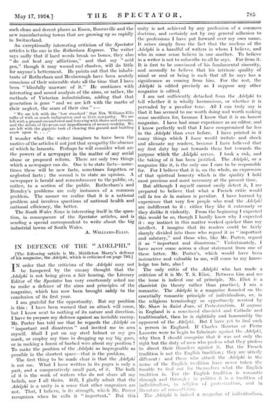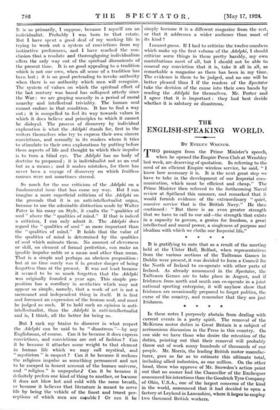IN DEFENCE OF THE " ADELPHI."
[The following article is Mr. Middleton Murry's defence of his magazine, the Adelphi, which is criticized on page 793.] IN order that the criticism of the Adelphi may not -I- be hampered by the uneasy thought that the Adelphi is not being given a fair hearing, the Literary Editor of the Spectator has very courteously asked me to make a defence of the aims and principles of the magazine, which has now been brought safely to the conclusion of its first year.
I am grateful for the opportunity. But my position is this : I have been warned that an attack will come, but I know next to nothing of its nature and direction. I have to prepare my defence against an invisible enemy. Mr. Porter lilts told me that he regards the Adelphi as " important and disastrous " and invited me to arm myself. Shall I put on my steel helmet or my gas mask, or employ my time in dragging up my big guns, or in making a forest of barbed wire about my position ? To make the position of the Adelphi as impregnable as possible in the shortest space—that is the problem.
The first thing to be made clear is that the Adelphi is not me. What I have written in its pages is only a part, and a comparatively small part, of it. The bulk of it is the work of writers who do not share all my beliefs, nor I all theirs. Still, I gladly admit that the Adelphi is a unity in a sense that other magazines arc not. That, I believe, is its strength, which Mr. Porter recognizes when he calls it " important." But this unity is not achieved by any profession of a common doctrine, and certainly not by any general adhesion to the professions I have put forward over my own name. It arises simply from the fact that the nucleus of the Adelphi is a handful of writers in whom I believe, and who in some sense believe in one another. To believe in a writer is not to subscribe to all he says. Far from it. It is first to be convinced of his fundamental sincerity, and secondly to believe that his intrinsic quality of mind or soul or being is such that all he says has a significance as coming from him. For the rest, the Adelphi is edited precisely as I suppose any other magazine is edited.
I am not sufficiently detached from the Adelphi to tell whether it is wholly harmonious, or whether it is pervaded by a peculiar tone. All I can truly say is that it has seemed to me worth doing and worth making some sacrifices. for, because I know that it is an honest magazine. I have had some experience as an editor, and I know perfectly well that I have compromised far less in the Adelphi than ever before. I have printed in it many things which I knew would irritate and shock and alienate my readers, because I have believed that my first duty lay not towards them but towards the purpose which the Adelphi serves. I took a risk, and the taking of it has been justified. The Adelphi, or a magazine like it, is the only one I care to be responsible for. For I believe that it is, on the whole, an expression of that spiritual honesty which is the quality I hold most precious and most necessary at the present time.
But although I myself cannot easily detect it, I am prepared to believe that what a French critic would call la ton de la maison is peculiar. I have learned by experience that very few people who read the Adelphi are indifferent to it : either they like it extremely or they dislike it violently. From the beginning I expected this would be so, though I hardly know why I expected it : my instinct in this matter worked quicker than my intellect. I imagine that its readers could be fairly sharply divided into those who regard it as " important and salutary," and those who, like Mr. Porter, regard it as " important and disastrous." Unfortunately, I have never come across a clear statement from one of these latter. Mr. Porter's, which would have been instructive and valuable to me, will come to my know- ledge too late, alas !
The only critic of the Adelphi who has made a criticism of it is Mr. T. S. Eliot. Between him and me the issue is indeed one of principle. Mr. Eliot is a classicist (in theory rather than practice), I am a romantic. The Adelphi is a magazine founded on the essentially romantic principle of individualism, or, in the religious terminology so opportunely revived by Mr. Shaw in Saint Joan, of Protestantism. If anyone in England is a convinced classicist and Catholic and traditionalist, then he is rightfully and honourably the opponent of the Adelphi. But I have yet to find such a person in England. If Charles Maurras or Pierre Lasserre were to begin to fulminate against the Adelphi, why then I should recognize that it was not only the right but the duty of men who profess what they profess to direct their thunders against it. But the French tradition is not the English tradition ; they arc utterly- different : and those who attack the Adelphi in the name of the English tradition have never taken the trouble to find out for themselves w hat the English tradition is. For the English tradition is romantic through and through : in polities it is a tradition of individualism, in religion of protestantism, and in literature of romniiticism.
The Adelphi is indeed a magazine of individualism. It is so primarily, I suppose, because I myself am an individualist. Probably I was born to that estate. But I have spent a good deal of my working life in trying to work out a system of convictions from my instinctive preferences, and I have reached the con- clusion that a resolute and thoroughgoing individualism offers the only way out of the spiritual discontents of the present time. It is no good appealing to a tradition which is not our own, when all sense of a tradition has been lost ; it is no good pretending to invoke authority when there is no authority which men will recognize. The system of values on which the spiritual effort of the last century was based has collapsed utterly since the War : we are groping uneasily in a period of moral anarchy and intellectual triviality. The human soul cannot endure in that condition. It has to find a way out ; it is compelled to feel its way towards values in which it does believe and principles to which it cannot be disloyal. The process of discovery by individual exploration is what the ..4delphi stands for, first in the writers themselves who try to express their own sincere convictions, and secondly in its readers whom it tries to stimulate to their own explorations by putting before them aspects of life and thought to which their impulse is to turn a blind eye. The Adelphi has no body of doctrine to propound ; it is individualist not as an end but as a means ; and it makes mistakes, for there has never been a voyage of discovery on which fruitless courses were not sometimes steered.
So much for the one criticism of the Adelphi on a fundamental issue that has come my way. But I can imagine a more superficial criticism of the Adelphi on the grounds that it is an anti-intellectualist organ, because to use the admirable distinction made by Walter Pater in his essay on Style, it exalts the " qualities of soul " above the " qualities of mind." If that is indeed a criticism, I can only admit it. The Adelphi does regard the " qualities of soul " as more important than the " qualities of mind." It holds that the value of the qualities of mind is determined by the qualities of soul which animate them. No amount of cleverness or skill, no clement of formal perfection, can make an ignoble impulse noble or a mean soul other than mean. That is a simple and perhaps an obvious proposition : but at no time surely was it in greater danger of being forgotten than at the present. It was not least because it seemed to be so much forgotten that the Adelphi was originally founded a year ago. This simple pro- position has a corollary in aesthetics which may not appear so simple, namely, that a work of art is not a sacrosanct and independent thing in itself. It is first and foremost an expression of the human soul, and must be judged as such. If to hold such an opinion is anti- intellectualist, than the Adelphi is anti-intellectualist and is, I think, all the better for being so.
But I rack my brains to discover in what respect the Adelphi can be said to be " disastrous "—by any Englishman, of course. Can it be because it does express convictions, and convictions are out of fashion ? Can it be because it attaches some weight to that element in human life which we may call mystical, and " mysticism " is suspect ? Can it be because it reckons the religious impulse as something permanent and not to be escaped in honest account of the human universe, and " religion " is unpopular 2 Can it be because it definitely prefers one kind of thing to another, or bwause it does not blow hot and cold with the same breath, or because it believes that literature is meant to serve life by being the vehicle of the finest and truest per- ceptions of which men are capable ? Or can it be simply because it is a different magazine from the rest, or that it addresses a wider audience than most of its kind ?
I cannot guess. If I had to criticize the twelve numbers which make up the first volume of the Adelphi, I should criticize some things in them pretty harshly, my own contributions most of all, but I should not be able to conceal my conviction that it is, take it all in all, as remarkable a magazine as there has been in my time. The evidence is there to be judged, and no one will be better pleased than I if the readers of the Spectator take the decision of the cause into their own hands by reading the Adelphi for themselves. Mr. Porter and I agree that it is important : they had best decide whether it is salutary or disastrous.



















































 Previous page
Previous page